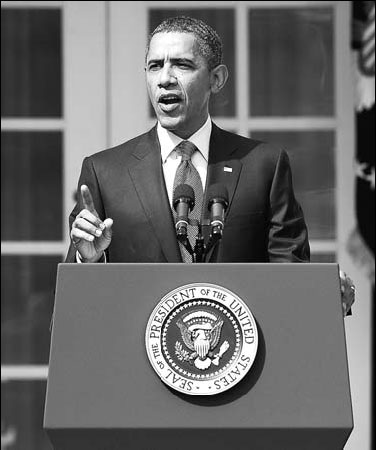Obama calls for new taxes
|
US President Barack Obama on Monday at the White House in Washington called for $1.5 trillion in tax increases over the next decade to help trim the nation's deficit. Joshua Roberts / Bloomberg |
WASHINGTON - A combative US President Barack Obama on Monday demanded that the richest US citizens pay higher taxes to help cut soaring US deficits by more than $3 trillion as he drew clear battle lines for next year's elections.
He promised to veto any effort by congressional Republicans to cut government healthcare benefits for the elderly without raising taxes as well.
The president's proposal would predominantly hit upper-income taxpayers and would also target tax loopholes and subsidies used by many larger corporations.
It would spare retirees from any changes in Social Security retirement benefits, and it would direct most of the cuts in Medicare spending to healthcare providers, not its elderly beneficiaries.
Benefit programs wouldn't be unscathed. Obama's plan would reduce spending for those, including Medicare and Medicaid, the government health care program for the poor, by $580 billion.
But with Republicans calling for massive cuts in entitlement programs, Obama said he would veto any legislation that cut Medicare benefits without raising new revenue.
New measures
His plan also would count savings of $1 trillion over 10 years from the withdrawal of US troops from Iraq and Afghanistan.
The deficit-reduction plan represents Obama's longer-term follow-up to the $447 billion in tax cuts and new public works spending that he has proposed as a short-term measure to stimulate the economy and reduce unemployment.
The new proposal also inserts the president's voice into the legislative discussions of a joint congressional "supercommittee" charged with recommending deficit reductions of up to $1.5 trillion.
Defending his emphasis on new taxes rather than only spending reductions, Obama said: "We can't just cut our way out of this hole."
The president announced his deficit reduction plan in a 20-minute speech at the White House. But even as he called for Congress to act and tackle the nation's escalating debt, he gave greater urgency to his separate, short-term jobs proposal.
"I'm ready to sign a bill," he said. "I've got the pens all ready."
Still, in calling for sizable tax revenue, Obama gave the congressional joint committee a choice: It could generate $1.5 trillion in new revenues through an overhaul of the tax code, or it could adopt his recommendations, most of which are recycled from his previous budget proposals, which were largely ignored by Congress.
They include tax increases on high-income families, oil and natural gas companies and US-based corporations that earn profits overseas.
In either case, Obama is unlikely to get his way. The committee would be hard-pressed to undertake a wholesale restructuring of the tax code by its late November deadline. Also, the president's own proposals have little chance of making their way out of Congress intact.
But with Bush-era tax cuts set to expire at the end of 2012 and deep defense cuts scheduled to take effect in 2013 if the joint committee fails to act, Obama set down clear lines for next year's elections.
The plan represents Obama's opening bid in the debate. Administration officials say he is open to other deficit reduction measures, including a gradual increase in the eligibility age for Medicare from 65 to 67.
Deficit reduction
The core of the president's plan totals just over $2 trillion in deficit reduction over 10 years. It would let Bush-era tax cuts for upper income earners expire, limit tax deductions for wealthier filers, close loopholes and end some corporate tax breaks.
It also would trim mandatory programs, including Medicare, and target subsidies for farmers and retirement benefits for federal employees.
Illustrating Obama's populist pitch on taxes, he also suggested that Congress establish a minimum tax on taxpayers making $1 million or more in income.
The measure - the White House calls it the "Buffett Rule" for billionaire investor Warren Buffett - is designed to prevent millionaires from taking advantage of lower tax rates on investment earnings than what middle-income taxpayers pay on their wages.
On average, however, the wealthiest people in America pay a lot more in taxes than the middle class or the poor, according to the nonpartisan Tax Policy Center.
This year, households making more than $1 million will pay, on average, 29.1 percent of their income in federal taxes.
A household making between $50,000 and $75,000 will pay 15 percent of its income in federal taxes, which includes income taxes and Social Security payroll taxes.
Associated Press
(China Daily 09/21/2011 page16)















